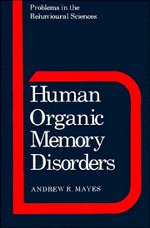Book contents
- Frontmatter
- Contents
- Acknowledgements
- 1 Healthy and pathological memory: the underlying mechanisms
- 2 The assessment of memory disorders
- 3 Disorders of short-term memory
- 4 Disorders of previously well-established memory
- 5 The memory problems caused by frontal lobe lesions
- 6 Organic amnesia
- 7 Animal and biochemical models of amnesia
- 8 Less well-characterized memory disorders
- 9 Overview
- Glossary
- Bibliography
- Index
- Frontmatter
- Contents
- Acknowledgements
- 1 Healthy and pathological memory: the underlying mechanisms
- 2 The assessment of memory disorders
- 3 Disorders of short-term memory
- 4 Disorders of previously well-established memory
- 5 The memory problems caused by frontal lobe lesions
- 6 Organic amnesia
- 7 Animal and biochemical models of amnesia
- 8 Less well-characterized memory disorders
- 9 Overview
- Glossary
- Bibliography
- Index
Summary
Organic amnesia is a fairly common disorder, but most often the amnesia is intermixed with other cognitive symptoms because the brain damage that is responsible for it extends into regions unconnected with the amnesia, such as the association neocortex. Pure cases of amnesia show four major characteristics, two positive and two negative. First, intelligence, as assessed by standard tests, such as the WAIS, is preserved. Although the fine print of this claim is still disputed by some, patients with exceedingly poor memory have been described with IQs of 140. Subtle and selective cognitive deficits cannot be excluded yet, but there is no real evidence for them. Second, short-term memory, as assessed by digit span and the recency effect, is preserved. Third, there is poor acquisition and retention of new episodic and semantic information (anterograde amnesia). And fourth, there is poor memory for information that was acquired pre-traumatically (retrograde amnesia). As will be discussed in more detail later in this chapter, not all kinds of memory are disturbed in amnesics. It has been claimed that amnesics show preserved learning and memory for certain motor, perceptual, and cognitive skills, for conditioning, and for what was referred to in chapter 1 as priming (i.e., changed or more efficient processing of stimuli that results from having recently perceived them).
- Type
- Chapter
- Information
- Human Organic Memory Disorders , pp. 124 - 194Publisher: Cambridge University PressPrint publication year: 1988

